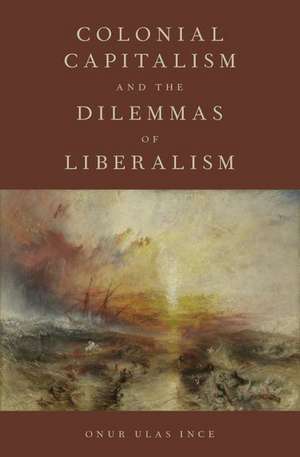Colonial Capitalism and the Dilemmas of Liberalism
Autor Onur Ulas Inceen Limba Engleză Hardback – 17 mai 2018
| Toate formatele și edițiile | Preț | Express |
|---|---|---|
| Paperback (1) | 247.39 lei 31-37 zile | |
| Oxford University Press – 12 mar 2020 | 247.39 lei 31-37 zile | |
| Hardback (1) | 532.92 lei 31-37 zile | |
| Oxford University Press – 17 mai 2018 | 532.92 lei 31-37 zile |
Preț: 532.92 lei
Preț vechi: 713.74 lei
-25% Nou
101.99€ • 106.20$ • 86.19£
Carte tipărită la comandă
Livrare economică 28 februarie-06 martie
Specificații
ISBN-10: 0190637293
Pagini: 232
Dimensiuni: 239 x 157 x 25 mm
Greutate: 0.45 kg
Editura: Oxford University Press
Colecția OUP USA
Locul publicării:New York, United States
Descriere
By the mid-nineteenth century, Britain celebrated its possession of a unique "empire of liberty" that propagated the rule of private property, free trade, and free labor across the globe. The British also knew that their empire had been built by conquering overseas territories, trading slaves, and extorting tribute from other societies. Set in the context of the early-modern British Empire, Colonial Capitalism and the Dilemmas of Liberalism paints a striking picture of these tensions between the illiberal origins of capitalism and its liberal imaginations in metropolitan thought.
Onur Ulas Ince combines an analysis of political economy and political theory to examine the impact of colonial economic relations on the development of liberal thought in Britain. He shows how a liberal self-image for the British Empire was constructed in the face of the systematic expropriation, exploitation, and servitude that built its transoceanic capitalist economy. The resilience of Britain's self-image was due in large part to the liberal intellectuals of empire, such as John Locke, Edmund Burke, and Edward Gibbon Wakefield, and their efforts to disavow the violent transformations that propelled British colonial capitalism. Ince forcefully demonstrates that liberalism as a language of politics was elaborated in and through the political economic debates around the contested meanings of private property, market exchange, and free labor.
Weaving together intellectual history, critical theory, and colonial studies, this book is a bold attempt to reconceptualize the historical relationship between capitalism, liberalism, and empire in a way that continues to resonate with our present moment.
Recenzii
By bringing the history of capitalism back to the fore of political theory, Ince has presented us with a powerful and urgent contribution to the field that bears as much on the study of liberalism and empire as on ongoing interpretive debates over historical context.
Ince's innovative readings of these three thinkers reframe liberal theory as intimately and constitutively bound up with the predations of colonial capitalism
In a lively, original analysis of British imperialism, one that ranges across continents as well as centuries, Ince provocatively makes the case for taking the history of capitalism seriously. It deserves to be read by anyone invested in the liberalism and empire debate.
Ince's clever historical study of liberal ideology analyzes the attempt by John Locke, Edmund Burke, and Edward Gibbon Wakefield to figure liberal democratic values as compatible with capitalism in the British colonies. ... Against but also augmenting competing arguments that explain colonialism via British culturalist arrogance or one-dimensional universal cosmopolitanism, Ince (Singapore Management Univ., Singapore) shows how key aspects of political economy (in Locke, money; in Burke, commercial society; in Wakefield, nominally "free" labor and artificially produced scarcity in land) provided moral insulation for imperial expansion: a distinctively British empire of liberty.
That in the course of his intrepid and penetrating study Ince both decisively renovates and effectively supersedes the Macphersonite scheme is thrilling. - Samuel Moyn, Perspectives on Politics
Notă biografică
Onur Ulas Ince is a political theorist with research interests in the history of political thought, political economy, history of capitalism, and imperial studies. He mainly investigates how socioeconomic transformations constitutive of global capitalism have shaped and in turn have been shaped by various discourses of political economy since the early-modern period. His research has been published in The Journal of Politics, History of PoliticalThought, New Political Economy, The Review of Politics, Polity, and Rural Sociology. He received his PhD in Government from Cornell University.
